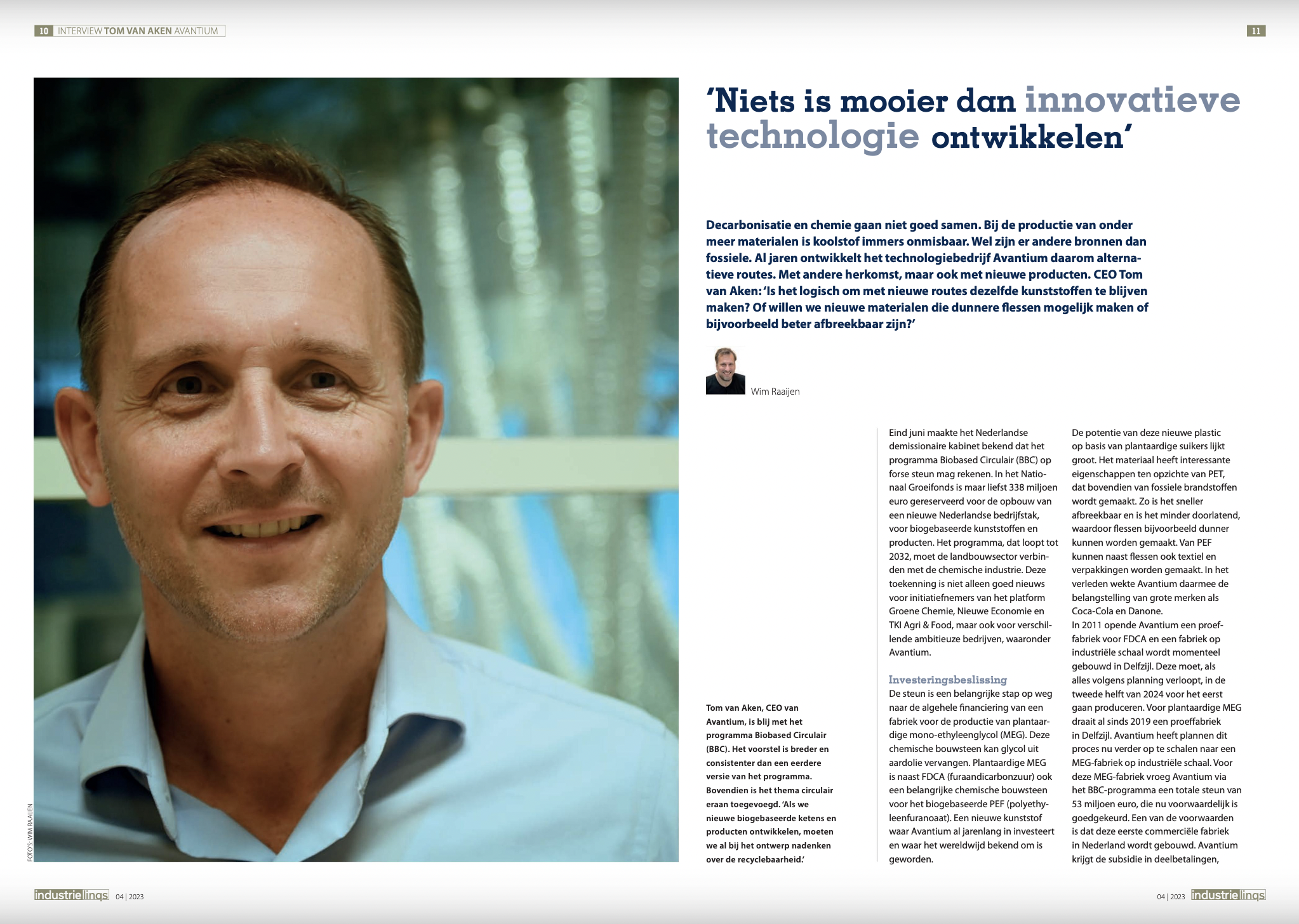The Netherlands – Carbon is indispensable in the production of various materials. So alternative sources other than fossil are needed. For years, Dutch technology company Avantium has been developing alternative routes. CEO Tom van Aken in an interview with Dutch magazine Industrielinqs: “Is it logical to continue making the same plastics with new routes, or do we want new materials that enable thinner bottles or are more biodegradable?”
Early summer the Dutch government announced substantial support for the Biobased Circular (BBC) program. A staggering €338 million has been allocated from the National Growth Fund to establish a new Dutch industry for biobased plastics and products. This program, running until 2032, aims to connect the agricultural sector with the chemical industry. This funding is good news for Avantium.
PEF
This support is a crucial step towards securing overall financing for a plant. For the production of plant-based glycols, specifically mono-ethylene glycol (MEG). This chemical building block can replace glycol from petroleum. MEG along with also plant-based FDCA , is a significant chemical building block for PEF. The is a new plastic that Avantium has been investing in for years and has gained global recognition.
€53 million
The potential of this new plant-based plastic appears promising. It possesses interesting properties compared to PET, which is made from fossil fuels. It is biodegradable and less permeable, allowing for the production of thinner bottles, among other applications. Besides bottles, PEF can be used in textiles and packaging. Avantium had previously attracted the interest of major brands like Coca-Cola and Danone. In 2011, Avantium opened a pilot plant for FDCA, and a full-scale industrial plant is currently under construction in Delfzijl, scheduled to commence production in the second half of 2024. A pilot plant for plant-based MEG has been operating in Delfzijl since 2019.
Avantium plans to scale this up to an industrial-scale MEG plant. For this MEG plant, Avantium applied for a total grant of €53 million through the BBC program, which has now been conditionally approved. One condition is that the first commercial plant must be built in the Netherlands. Avantium will receive the subsidy in installments, depending on the final investment decision.
Complex puzzle
Although having the plant in the Netherlands seems favorable given Avantium’s ongoing construction of its first commercial FDCA plant in the Eemsdelta region, near Delfzijl, it’s not a straightforward decision. Ensuring a sufficient supply of raw materials for MEG is crucial. Supplying sugars for the process seems promising in the northern and southwestern regions of the Netherlands, thanks to large sugar factories operated by companies like Cosun Beet Company in Groningen and Dinteloord, near Zeeland and Rotterdam.
However, the main challenge appears to be the availability of hydrogen, preferably green and emissions-free hydrogen. Tom van Aken mentions, “There are many investment plans in the North as well as in Zeeland and Rotterdam, but final decisions are still pending. If we want to start building the new MEG plant around 2025, there needs to be more certainty in this regard. This could be a decisive factor in determining the plant’s location. Creating new chains requires many green lights, from raw material to end product, and it’s a complex puzzle, as we know from experience.”
Polymers of the future
While many companies are already involved in recycling plastic waste, and several mechanical recycling chains exist, Van Aken is skeptical about many forms of chemical recycling. “I’m not convinced. If we’re already working with new carbon sources, does it make sense to continue making the same plastics? Or should we use this opportunity to develop new materials, like PEF, which is not only plant-based but also offers better properties than conventional plastics like PET? We’re more interested in these polymers of the future.”
Industrial scale
Developing new technology always requires patience. It’s a long journey. “We’ve been working on PEF development for over fifteen years, and we can only start commercial production in 2024. Furthermore, Avantium still doesn’t plan to become a major chemical producer. “We are a technology company with over 250 employees. There is nothing more satisfying for us than developing innovative technology. Our ultimate goal is to sell our technology through licenses. However, we have come to realize that we need to prove our technologies on an industrial scale first. That’s why we are now also building commercial plants.”


